David Cameron has vowed to deliver real reform of the European Union as he arrived at a summit in Latvia to meet fellow EU leaders for the first time since his UK general election victory.
Arriving for the talks in Riga, the prime minister acknowledged that discussions on renegotiating the terms of Britain’s membership would not be easy. But he said he was determined to give voters a “proper choice” in the in/out referendum he has pledged to hold by the end of 2017.
“It is an opportunity to start some of the discussions about the reform of the European Union. There will be ups and downs – you’ll hear one day this is possible, the next day something else is impossible.
“But one thing throughout all of this will be constant and that is my determination to deliver for the British people a reform of the European Union so they get a proper choice in that referendum we hold – an in/out referendum before the end of 2017.
“That will be constant. But there’ll be lots of noise, lots of ups and downs along the way.”The summit is the first time Cameron has had the chance to speak to a large number of leaders in person since he won a majority in the election, having pledged to hold a referendum on Britain’s EU membership by the end of 2017.
The main focus of the summit is talks between EU leaders and former Soviet countries including Ukraine, Azerbaijan, Armenia, Belarus, Georgia and Moldova. The turmoil in Ukraine and relations with Russia are likely to be at the top of the agenda.
Cameron is mainly seeking changes that would reduce immigration to Britain from other EU countries. On Thursday, figures showed net migration rose to 318,000 last year. He hopes to do this by restricting benefits for new arrivals from EU countries for four years, rather than imposing any restrictions on the overall number of EU immigrants. Other leaders, including Germany’s Angela Merkel, have indicated that the fundamental principle of free movement is non-negotiable.
Theresa May, the home secretary, indicated that the UK’s proposals amounted to a modification of this rule. “What we have also set out is that as a government we want to renegotiate the relationship with Europe, and as part of that, free movement – this issue of people being able to move around Europe freely – is one of the issues we want to look at,” she said on BBC Radio 4’s Today programme. “One of the questions within that is further tightening on welfare benefits. So for example, for in-work benefits, people would have to be here for a period of time, would have to live here for four years before they could claim that.”
Other British demands include an exclusion from the EU’s commitment to ever closer union and the ability of national parliaments to work together to block legislation. Cameron has sounded increasingly emboldened about achieving change in the European Union since his re-election.
A document leaked to the Times revealed that UK officials were suggesting that the EU should stop defining itself as a single-currency area, given that countries such as Britain and Denmark have kept their own. A Whitehall source said this was not the main thing on the UK’s wishlist, but that the government was on the lookout for anything that could be interpreted as discrimination against non-eurozone countries.
On Thursday, Wolfgang Schäuble, Germany’s finance minister, invited George Osborne, the UK chancellor, to Berlin to discuss Britain’s desire for treaty changes along with his country’s wish for more integrated fiscal policy in the eurozone. “We have talked about him coming to Berlin so that we can think together about how we can combine the British position with the urgent need for a strengthened governance of the eurozone,” the German minister said.
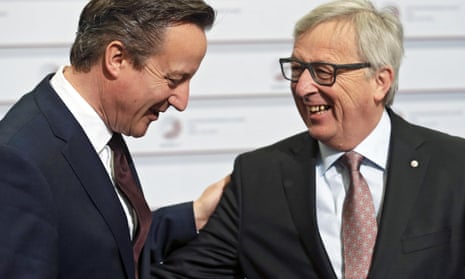
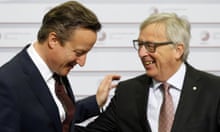
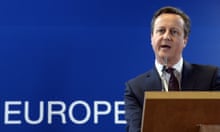
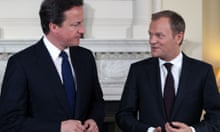
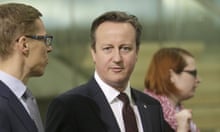
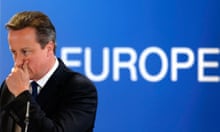


Comments (…)
Sign in or create your Guardian account to join the discussion